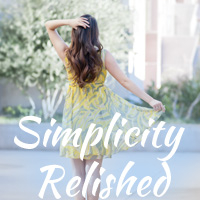Minimalism has helped me better understand beauty. But it took me a long time to get here.
When I was a little girl, my idol was Belle in Disney’s Beauty and the Beast. I wanted to clever, kind, sophisticated and beautiful. I wanted to be a princess-heroine who could be both winsome and gutsy. It was the perfect combination.
Enamored with Belle’s likeness and convinced of fairytales, I sought to cultivate an image of myself that fit my imagination. At first, this translated into dressing up as Belle two years in a row for Halloween (I still have the costume). Eventually, it turned into an obsession with clothing, makeup, body image and what others thought of me.
Related: Why I Shrank My Closet
Vanity is not beauty. In fact, it is possible to be so vain that you want to hide your vanity. As a teenager, I wanted to give off the air that I didn’t care at all how I looked– but deep inside, there was hardly a deeper longing.
Ultimately, I believe I always knew that beauty was neither simply internal nor external. Those who say that beauty is found within forget the simple loveliness of blossoms, or the majesty of mountains. Those who say that beauty is found without fail to recognize that words and actions emote the human spirit.
I’ve been on a journey to realize that beauty is so difficult to define because it neither starts nor ends with me. I cannot manufacture it on my own, or standardize it for others.

Why minimalism helps us understand beauty
It may be surprising that minimalism is helping me rediscover the true meaning of beauty– after all, the minimalist movement we talk about here is not limited to interior design or architecture.
Rather, minimalism allows us to see things as they truly are, without ornamentation, augmentation, or decoration. It allows us to see things as they were created to be.
Minimalism appreciates what’s here.
There is so much to be grateful for in the present: before we reach all our goals, before we acquire everything on our wish list. In doing so, we find beauty all around us. Minimalism allows us to pause in the midst of our rushed, full lives, remembering that the weight of glory can rest on a single moment of self-sacrifice or kindness.
Minimalism distinguishes need from want.
If beauty neither starts nor ends with us– but with the creator of the universe– then we can find it whenever our needs are met. It is captured in the simplest of provisions: a crisp breath of air, a tasty morsel, a quenching sip of water. Wherever there is life, there are needs being met, and minimalism enables us to see this when we look beyond our immediate desires to the mysterious ways of nature.
Minimalism celebrates endurance.
Minimalists know that in order to own less, we must own the same things for a long time. Minimalism celebrates items that last– they are crafted with talent, built with intention. And when something does last, it grows in beauty. It begins to carry memories, perhaps even multiple owners, traversing through seasons with us. I love being able to look at a piece of jewelry or clay teacup and remember what it was like to enjoy these items even years ago, and to continue enjoying it in the present.
Minimalism reveals what matters most.
The more we pare down, the more clear our priorities become. As a minimalist, the things I cherish most are always before me; they are no longer hidden by physical, emotional or mental clutter. Because I am able to see what I love (both physically and spiritually), I find myself appreciating the beauty of those priorities so much more readily.

The bottom line: minimalism points us toward true beauty
Beauty is most revealed in simplicity, because simplicity gets us close to the original state of things. Whether biting into a ripe strawberry as the flavors burst into a red riot, or wandering through a redwood grove and inhaling the denseness of the trees’ fragrance, we fall in love with the way things were supposed to be because it resonates so deeply inside of us.
So if you’re longing for more beauty in your life, it’s not enough to simply look outwardly and inwardly. We must look beyond the distractions and obstructions by embracing minimalism, and become aware of the greater reality into which we’re invited.

